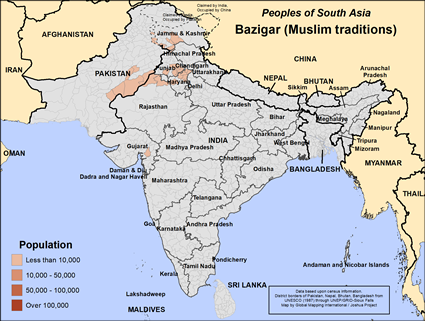The Muslim Bazigar or Goaar live in northwest India. Their name comes from the Urdu word "bazi" which means acrobat. The Bazigar were originally Hindus. A small group of them became Muslims during the Delhi Sultanate and Mughal periods. The traditional occupation of the Bazigar was that of being acrobats, dancers, musicians, jugglers and wrestlers. The Bazigar would travel from village to village. They would hire themselves out as farm agricultural laborers. They would also perform at festivals and holidays as dancers, drummers and acrobats. They would perform for Hindu, Muslim and Sikh villages.
Today less than one out of five Bazigars engage in the itinerate lifestyle. Most have settled down and work in agriculture. They still like to dance, sing, play music and do feats of strength and agility. The Bazigars have been classified as a Scheduled Caste due to their low level of education. In 1981, only 11% of the Bazigar could read and write. Illiteracy continues to be a problem for them today.
The main languages of the Muslim Bazigar of India are Urdu, Eastern Punjabi, Kashmiri and Dogri.
Muslim Bazigar live in the Indian states of Jammu and Kashmir, Punjab, Haryana and Rajastan.
Most Bazigar now work in agriculture as laborers. They also work as
shopkeepers, public officials and grocers. They raise goats and sheep for their meat and milk. Muslim Bazigar do not eat pork. Many Bazigar still have musical and athletic skills, which they perform at important family events and holidays.
The Bazigar marry within their community. Families arrange marriages. Sons inherit property with the eldest son gaining possession of the family home. Caste councils promote their interests and settle legal disputes.
The Bazigar people of India are Sunni, the largest branch of Islam. They attempt to obey the teachings of the Qur 'an and the prophet Muhammad. They believe that by following the Five Pillars of Islam that they will attain heaven when they die. Sunnis pray five times a day facing Mecca. They fast the month of Ramadan. They attend mosque services on Friday. If a Muslim has the means, he or she will make a pilgrimage to Mecca once in his or her lifetime.
The two main holidays for Sunni Muslims are Eid al Fitr, the breaking of the monthly fast and Eid al Adha, the celebration of Abraham's willingness to sacrifice his son to Allah.
The Muslim Bazigar need to hear the life-changing message of Jesus Christ in a way the can understand. They need help in educating their The Bazigar need to hear the life-changing message of Jesus Christ in a way they can children and in learning new job skills. They need to see Christianity lived out before them in practical ways.
Pray that the Lord sends workers to the Bazigar to tell them about Jesus and His love for them.
Pray that a strong movement to Jesus will bring whole Bazigar families and communities into a rich experience of God's blessings.
Pray the Bazigar people will understand that Jesus desires to bless their families and communities, not harm them.
Scripture Prayers for the Bazigar (Muslim traditions) in India.
en.wikipedia.org/wiki/Bazigar
http://citeseerx.ist.psu.edu/viewdoc/download?doi=10.1.1.692.2886&rep=rep1&type=pdf
| Profile Source: David Kugel |











